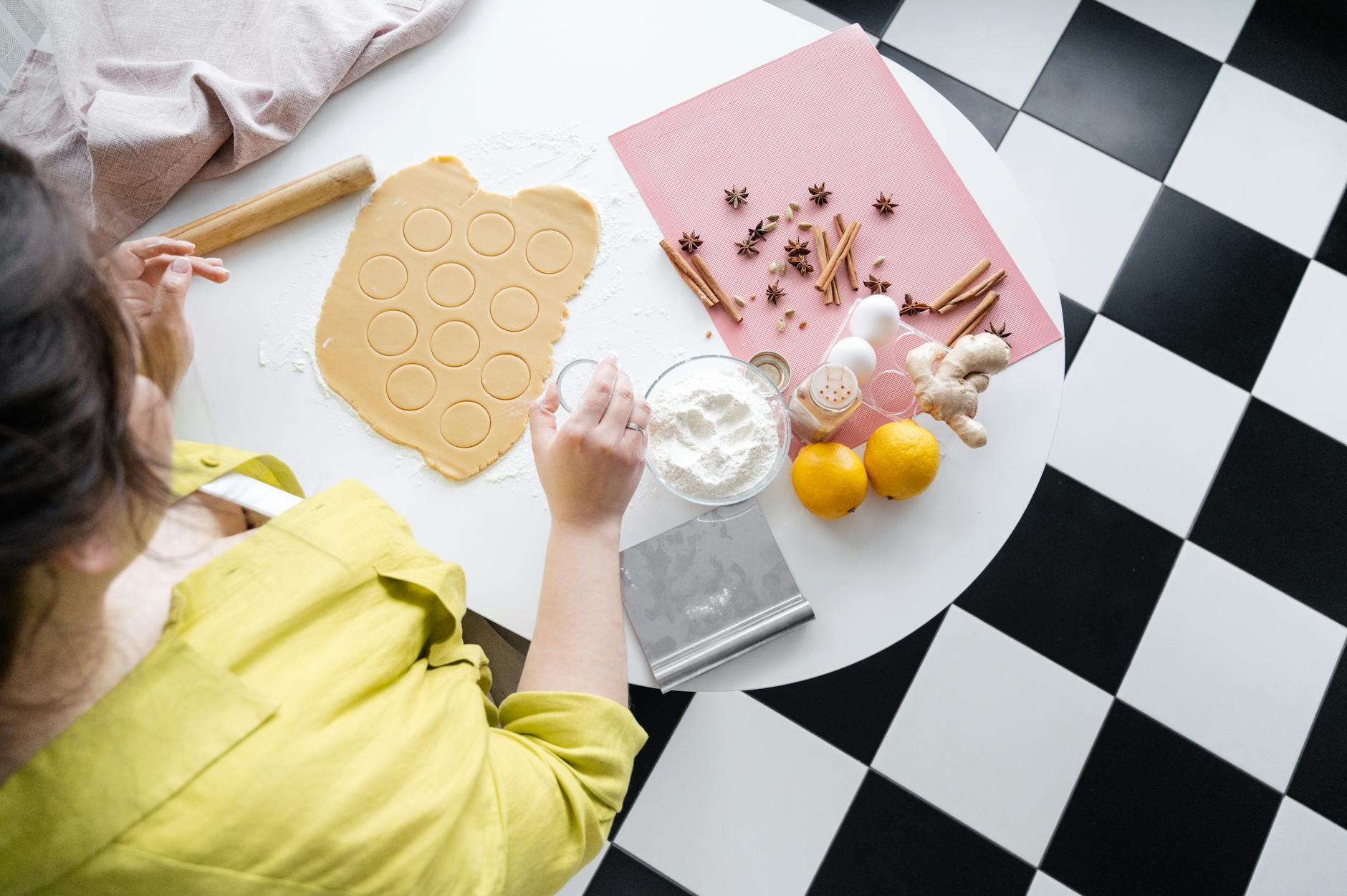Discover the secrets behind living gluten-free and the truths about celiac disease in this eye-opening blog post.
Table of Contents
- Welcome to the Celiac Journey!
- Why Gluten Makes Celiac Fighters Unwell
- Spotting the Signs of Celiac Disease
- Becoming a Detective: How is Celiac Disease Discovered?
- The Gluten-Free Squad: Living with Celiac Disease
- Helpful Tools for Celiac Warriors
- You’re Not Alone: Joining the Celiac Community
- Getting Stronger Every Day
- Fun Fact Corner: Did You Know?
- Wrapping It All Up
- Frequently Asked Questions (FAQs)
Welcome to the Celiac Journey!
We’re opening the doors to understanding celiac disease, a health condition that affects some people’s bodies.
What is Celiac Disease?
Celiac disease is a special condition where certain foods can make people very sick. When someone with celiac disease eats foods with gluten, their body reacts in a way that can cause a lot of problems.
Why It’s Called an Autoimmune Disorder
Celiac disease is like a mix-up inside the body. Instead of protecting itself, the body’s defense system attacks parts of the body by mistake. That’s why it’s called an autoimmune disorder.
Why Gluten Makes Celiac Fighters Unwell
Gluten is a type of protein found in wheat, barley, and rye. It gives bread and pasta their chewy texture.
How Gluten Affects the Body
For someone with celiac disease, gluten can be like a villain in their body. When a person with celiac eats gluten, their immune system gets confused and starts attacking the lining of their intestines. This causes chronic inflammation, which is like a continuous battle happening inside their body. Over time, this inflammation can lead to intestinal damage.
Spotting the Signs of Celiac Disease
When your body is not happy with gluten, it might tell you in different ways. Here are some signs that could mean you have celiac disease:
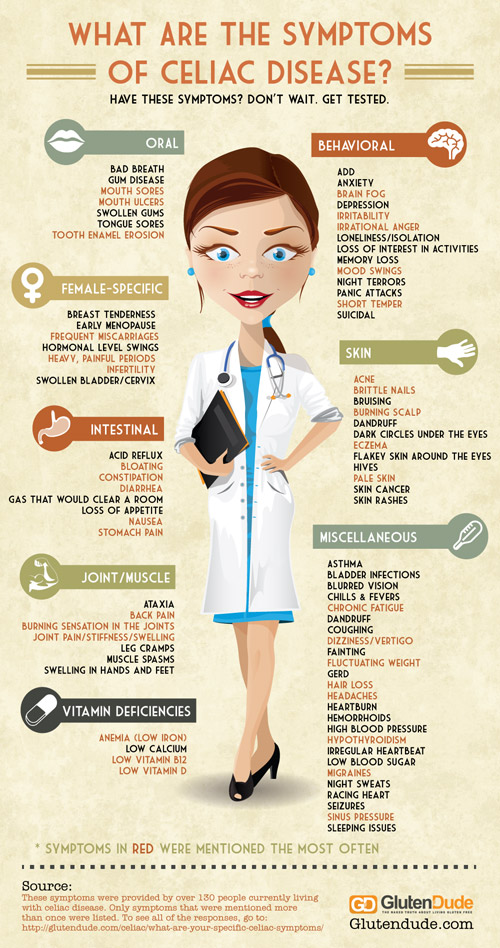
Image courtesy of glutendude.com via Google Images
– Tummy Troubles: Your stomach might feel crampy, gassy, or really upset after you eat.
– Puzzling Potty Problems: You might visit the bathroom a lot more than usual or have loose, watery poop.
– Energy Zapper: Feeling tired all the time, even when you get enough sleep.
– Not so Hungry: Losing your appetite and not wanting to eat much.
– Growing Pains: Your growth might slow down, making you shorter than you should be.
– Skin Secrets: Strange rashes or itchy skin that just won’t go away.
Why these Symptoms Happen
Imagine that your body is like a superhero team, and gluten is the villain causing trouble. When people with celiac eat gluten, their superhero team gets mixed up and starts fighting each other instead of the bad guy. This mix-up causes damage to the intestines, making it hard for the body to get the good stuff from food.
Becoming a Detective: How is Celiac Disease Discovered?
Just like detectives solving a mystery, doctors have special tools and tests to figure out if someone has celiac disease. Let’s uncover the secrets of how this autoimmune disorder is discovered.
Tests for Celiac Disease
When someone shows signs of celiac disease, doctors use various tests to find out for sure. One common test is a blood test that looks for certain antibodies that the body makes in response to gluten. If this test comes back positive, the next step is usually an intestinal biopsy.
Reading the Clues
By examining a tiny piece of the intestine taken during the biopsy, doctors can detect any damage caused by celiac disease. The villi, which are tiny finger-like projections in the intestine, may appear flattened and damaged in those with celiac disease due to their reaction to gluten. This damage is a clear sign that celiac disease is present.
The Gluten-Free Squad: Living with Celiac Disease
People with celiac disease can still enjoy delicious food while staying healthy. Let’s explore what they can eat safely!
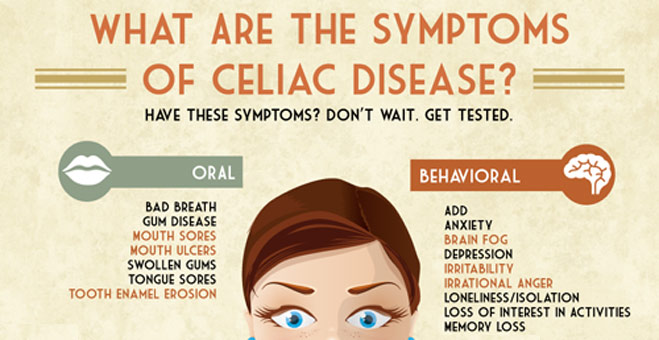
Image courtesy of glutendude.com via Google Images
Foods to Say Yes to!
There are plenty of tasty foods that are gluten-free and safe for those with celiac disease. Fruits and vegetables, meats and fish, dairy products, and gluten-free grains like rice and quinoa are all great options. Additionally, there are many gluten-free versions of favorite treats like cookies, cakes, and bread available in stores.
Foods to Wave Goodbye To
Unfortunately, people with celiac disease need to steer clear of foods that contain gluten. This means avoiding products like bread, pasta, cereal, and baked goods made with wheat, barley, or rye. It’s important to always check food labels carefully to make sure a product is gluten-free before consuming it.
Helpful Tools for Celiac Warriors
Going to the grocery store can sometimes feel like entering a giant puzzle, especially when you’re trying to avoid gluten. One vital tool for anyone with celiac disease is knowing how to read food labels. By looking at the ingredients list, you can quickly see if a product contains gluten. Keep an eye out for words like wheat, barley, or rye, as these are common sources of gluten. Remember, even if a product doesn’t contain gluten ingredients, it could still be at risk of cross-contamination, so be cautious.
Apps and Guides
In this modern age, technology can be a powerful ally for those following a gluten-free diet. There are many apps and guides available that can make navigating a gluten-free lifestyle easier and more enjoyable. These tools can help you find nearby restaurants with gluten-free options, scan product barcodes to check for gluten content, and even discover new recipes to try at home. By incorporating these apps and guides into your daily routine, you can stay organized, informed, and confident in your food choices.
You’re Not Alone: Joining the Celiac Community
Having celiac disease can sometimes feel like you’re on a special journey. But guess what? You’re not alone! There are many others out there who understand what it’s like to live with celiac disease. Let’s dive into the celiac community and discover how connecting with others can make this journey a lot brighter.
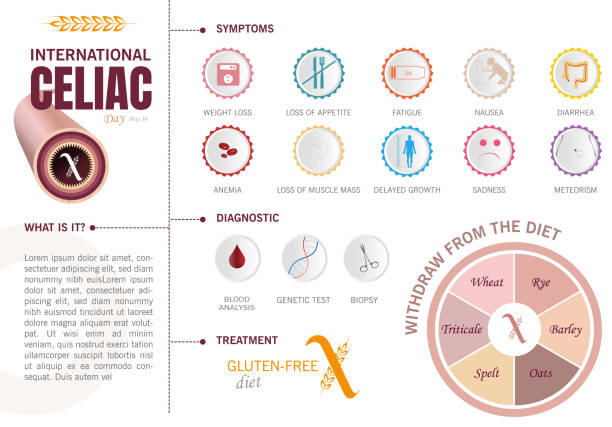
Image courtesy of www.istockphoto.com via Google Images
Support Groups and Resources
If you’re looking to meet others who are also navigating the world of gluten-free living, joining a celiac support group can be a fantastic idea. These groups bring together people who share similar experiences, challenges, and triumphs when it comes to managing celiac disease. You can find support groups in your local community or even online through social media platforms and dedicated websites.
Sharing and Learning Together
One of the best parts of being a part of the celiac community is the opportunity to connect with others who understand your journey. Whether it’s swapping recipes for delicious gluten-free meals, sharing tips for dining out safely, or simply chatting about the ups and downs of living with celiac disease, being part of a supportive community can provide valuable insights, camaraderie, and friendship.
| Chapter | Title | Summary |
|---|---|---|
| 1 | The Basics of Celiac Disease | An introduction to celiac disease, its symptoms, and how it is diagnosed. |
| 2 | Gluten and Its Effects | Exploring the role of gluten in celiac disease and how it affects the body. |
| 3 | Gluten-Free Diet | Guidance on how to follow a gluten-free diet, including food to avoid and alternatives to gluten-containing products. |
| 4 | Living Well with Celiac Disease | Tips for managing celiac disease in daily life, including dining out, traveling, and coping with social situations. |
Getting Stronger Every Day
Imagine feeling stronger and healthier every day, just by making a small change in your diet! That’s the power of sticking to a gluten-free diet for people with celiac disease. By saying goodbye to gluten-containing foods, those with celiac can repair the damage done to their bodies and feel better than ever.
Staying Positive and Healthy
Living with celiac disease doesn’t have to be boring or sad. Staying positive and healthy is key to managing this condition with ease. By focusing on all the delicious gluten-free foods you can enjoy, maintaining a positive attitude, and taking care of your body, you can live a happy and fulfilling life despite having celiac disease.
Fun Fact Corner: Did You Know?
Let’s uncover some fascinating facts about celiac disease that might surprise you!
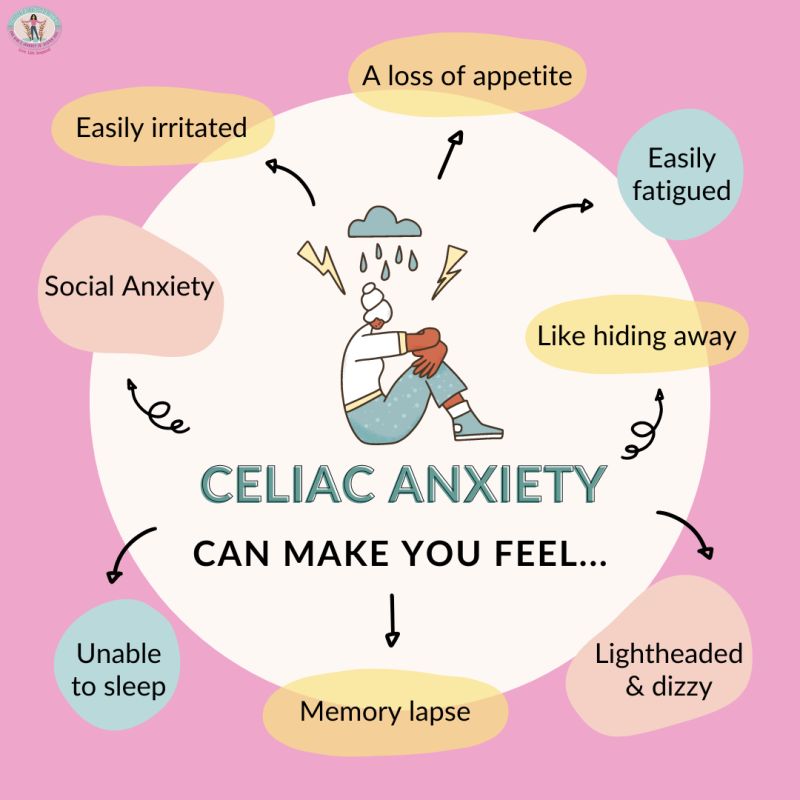
Image courtesy of www.linkedin.com via Google Images
1. Celiac Disease and Genetics
Did you know that celiac disease can run in families? If a family member has celiac disease, there is a higher chance that someone else in the family might also have it.
2. Ancient History of Gluten Intolerance
Ancient civilizations like the Egyptians and Greeks experienced symptoms similar to celiac disease but didn’t know the cause. It’s fascinating to think that this condition has been around for centuries!
3. The Misunderstood Symptoms
It’s not always easy to spot celiac disease because its symptoms can vary widely. Sometimes people may not show any signs at all, while others might have clear symptoms. This elusive nature can make it challenging to diagnose.
4. Celiac Disease and Other Autoimmune Disorders
People with celiac disease might be more likely to have other autoimmune disorders, such as Type 1 Diabetes or Hashimoto’s Disease. Understanding the connections between these conditions can help doctors better manage and treat them.
Wrapping It All Up
Today, we have taken a deep dive into the world of celiac disease and the importance of following a gluten-free diet for those affected by this autoimmune disorder. Let’s quickly recap everything we’ve learned!
Key Takeaways:
In our journey through celiac disease, we discovered that it is an autoimmune disorder where the body mistakenly attacks itself when gluten is consumed. This leads to chronic inflammation and intestinal damage, causing a range of symptoms that signal something is wrong.
Living Gluten-Free:
We explored the gluten-free diet, highlighting foods that are safe to eat and those that need to be avoided to keep celiac fighters healthy and strong. By following a gluten-free diet, individuals with celiac disease can improve their health and quality of life.
Support and Community:
It’s important to remember that no one has to face celiac disease alone. There are support groups and resources available to connect with others who understand the challenges of living gluten-free. Sharing experiences, recipes, and tips can make the journey easier and more enjoyable.
Staying Positive and Strong:
By staying positive, following a gluten-free diet, and surrounding themselves with supportive friends and communities, individuals with celiac disease can continue to thrive and feel their best every day. It’s all about staying informed, making healthy choices, and celebrating small victories along the way.
As we wrap up our exploration of celiac disease and the gluten-free lifestyle, remember that knowledge is power. By understanding celiac disease and living gluten-free, individuals can take control of their health and well-being, making every day a step towards feeling stronger and happier.
Frequently Asked Questions (FAQs)
Why do only some people have celiac disease?
Celiac disease is like picking a unique password for a specific club. Not everyone gets the special code to join the club, only a few lucky ones. In the same way, some people have a special code inside their bodies that makes them prone to getting celiac disease. It’s all about the genes – those tiny instructions in our bodies that make us who we are! So, if your body has the genetic code for celiac disease, then you might be one of the club members.
Can I ever eat gluten again if I have celiac?
Imagine your body throwing a big, messy party every time you eat gluten. People with celiac disease have bodies that don’t like this party and throw a huge tantrum to stop it – that tantrum is all the bad stuff happening inside the body. If someone with celiac disease eats gluten, it’s like inviting that messy party back! So, no, it’s not a good idea to cozy up with gluten if you have celiac disease. But don’t worry – there are plenty of gluten-free snacks that will keep your body happy and healthy!
How can I tell my friends about celiac disease?
Imagine celiac disease as a secret superhero power that you have. You might feel a bit nervous at first to tell your friends about this secret, but don’t worry! You can say something like, “Hey, my body doesn’t like gluten, so I have to eat special foods to stay healthy.” Your friends will understand and might even think it’s cool that you have your own special diet! Remember, it’s essential to share in a way that helps your friends understand how important it is to take care of your body.
